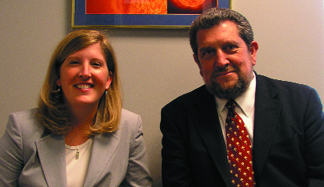 Geologists
Heidi Tringe and Gene Whitney have a rare view of the political process at work.
They also have become integral to that process through their work in the 50-person
Office of Science and Technology Policy (OSTP), in the White House.
Geologists
Heidi Tringe and Gene Whitney have a rare view of the political process at work.
They also have become integral to that process through their work in the 50-person
Office of Science and Technology Policy (OSTP), in the White House.Heidi Tringe and Gene Whitney are two geologists working in the Office of Science and Technology Policy, which advises the president of the United States. Photo by Naomi Lubick.
“Our job is to inform our bosses, Dr. Marburger and the president,” Whitney says. “It’s not really about political parties.” Tringe, who is 30 years old and a Republican, and Whitney, who is 55 years old and a Democrat, took very different routes to politics.
Tringe, who joined OSTP last March as the assistant for legislative affairs to Director John Marburger, had her first introduction to science and policy from her high-school chemistry teacher, who served as a part-time “citizen legislator” in her hometown, Montpelier, Vt. “I definitely had a lot of exposure to people involved in politics,” she says, and the citizen-legislator model “fosters a sense of community involvement.”
Her interest in science and politics led Tringe to Washington, D.C., in 1996, as the Government Affairs Program intern at the American Geological Institute (AGI, which publishes Geotimes). “For me, [geology was the] first science you could see in action,” says Tringe, who received her undergraduate geology degree at Amherst College in Massachusetts. “I love geology, I love politics.”
After her internship, Tringe went to work for Sen. Jim Jeffords (I-Vt.) and soon after became the communications director for the House science committee. Her work there, under Chairman Sherwood Boehlert (R-N.Y.), led her to OSTP, where she is now the liaison for communications between the Bush administration and Congress.
Whitney came to Washington, D.C., five years after Tringe, during the fallout from September 11. “For a solid year, homeland security swallowed everything,” Whitney says. “I was working on communications for first responders” among other topics, unable to address earth science issues until later.
“Frankly, I don’t know how I became a geologist,” Whitney says. He once thought he would become an art or English major as an undergraduate at Western Washington University, but instead, he followed his interests in natural systems to a Ph.D. at the University of Illinois, Urbana-Champaign, focusing on mineralogy and geochemistry. Whitney eventually became a research scientist with the U.S. Geological Survey (USGS), in Denver, Colo., where he spent over 20 years.
Whitney’s introduction to politics and science took place while he was managing the USGS geologists assessing oil and gas in Alaska’s Arctic National Wildlife Refuge (ANWR), and “the scientists had to defend their assessment,” Whitney says. Although he himself did not have to testify on ANWR, Whitney watched as Dave Houseknecht, Patrick Leahy and Charles Groat (all of USGS) appeared before Congress. Whitney says his own experience testifying on coalbed methane issues “was as influential in motivating me to take this [OSTP] position.”
Now, among other issues, Whitney looks at the future of Landsat (he once worked on the spectral reflectance of minerals for the precursor of Landsat 7). As a USGS employee detailed to the OSTP office, “I can raise the awareness and identify large earth science issues,” he says. “I’m personally interested in everything I work on here.”
In his three years at OSTP, Whitney has noticed that “research scientists and policy scientists are different creatures,” he says. “Research scientists are introverts, focusing on excruciating details. Here you can’t be an introvert,” Whitney says, to make the phone calls, attend the meetings, and cover every aspect of the job. It’s been a transition for him.
Both Whitney and Tringe also have seen changes in recent years in science policy. Tringe notes an expanded role of science on the Hill that has led to an explosion in opportunities for science policy. Universities, research centers and science think tanks are “becoming more proactive,” she says. “A lot of universities are becoming more savvy about how Washington works.”
Science policy now deals with “big impact, big money” subjects, Whitney says, giving the example of climate change, which cuts across many funding boundaries. Tringe gives the example of nanotechnology, which “crosses over so many agencies” for planning as well as future research funding. Most recently, Tringe says that she has enjoyed working on space exploration policy for the administration, and Whitney says that he is most concerned about water issues.
“Much of [OSTP’s] effectiveness comes from individuals taking initiative and recognizing issues that cut across agencies,” says Dave Applegate, head of geologic hazards at USGS (and formerly of AGI). When Whitney joined OSTP after the events of September 11, “he seized the initiative on natural hazards,” Applegate says, getting across the point that “coping with natural hazards translates to dealing with these unnatural ones.” And Applegate says that his former intern Tringe is “in many ways the natural candidate” for OSTP’s liaison position, because of her familiarity with issues that OSTP faces and her experience in the House science committee.
Seeing science on a day-to-day basis, watching “the ultimate discoveries” and reporting them to her constituency — first Congress and now the White House — has been “fascinating,” Tringe says. “It’s nice to work for something you believe in.”

